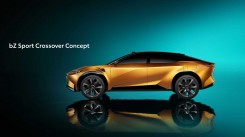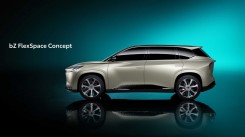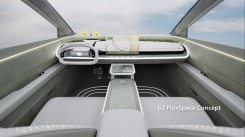Toyota teases ambitious new battery tech
Toyota is no stranger to innovation but is very late to the EV party and it knows it. Desperately trying to make up for the lost time, the Japanese automobile giant has some ambitious plans up its sleeves for its upcoming electric vehicle line-up. From lofty promises of 497 miles range by 2026 to groundbreaking strides in solid-state battery tech, Toyota is setting the stage for the future of EVs.
First and foremost, Toyota's big announcement was the reveal of its advanced batteries. By 2030, Toyota intends to power 1.7 million of its 3.5 million BEVs worldwide with these new-generation batteries. How? By banking on four distinct next-generation battery types: three liquid electrolyte battery technologies and one solid-state battery.

When it comes to liquid electrolytes - currently the staple tech for BEVs - Toyota seems focused on holistic improvements. This means a heightened energy density, cost-effectiveness, and swifter charging speeds. Toyota is set to introduce three prime battery types under this umbrella: Performance, Popularization, and High-Performance.
The Performance battery, a lithium-ion beast, aims to take center stage in 2026. Paired with sophisticated vehicle aerodynamics and a trim vehicle weight, Toyota promises a driving range surpassing 497 miles. And if that wasn't enticing enough, they're targeting a 20% cost reduction from their current electric model, the bZ4X SUV. Quick charging? You bet. Think 20 minutes or less from 10 to 80% charge.

For the more price-conscious folks, the Popularization battery might pique interest. Housing a lithium iron phosphate (LFP) chemistry, it's a wallet-friendly yet top-grade option. Toyota's unique bipolar tech - which was previously used in its nickel-metal-hydride batteries - will back this battery. Making its debut between 2026 and 2027, the Popularization battery hopes to offer 20% more range than the bZ4X and a 40% slash in price from the current EV SUV model.
The third liquid battery type, aptly named High-Performance, merges lithium-ion chemistry with a high-nickel cathode. This combo hopes to achieve an astonishing {621 miles}} of driving range by 2027-2028. Financially, it aims for a further 10% cost cut from the Performance battery, all while boasting a 20-minute charging time.
But the real showstopper here might be the solid-state battery. Toyota's been cooking up something special in this department. Historically, solid-state batteries had their drawbacks, especially concerning longevity. But Toyota's convinced they've cracked the code. They're talking about a solid-state battery that offers swift ion movement, endures high voltages, and tolerates sweltering temperatures, all without compromising the battery life.
Targeting a commercial launch by 2027-2028, Toyota's first solid-state battery might offer up a 621 miles of range. And the charging time? A mere 10 minutes from 10 to 80%. If that wasn't impressive enough, Toyota's higher-specification li-ion solid-state battery will deliver an impressive 745 miles of range.
Of course, Toyota's also been reimagining the aesthetics. The company eyes slimmed down the battery packs. If a battery is too tall, it affects a vehicle's height, influencing aerodynamics and, by extension, range. Plans are afoot to slice battery height to 4.72 inches, a notable reduction from the current bZ4X 5.9 inches. For those sportier BEVs? Expect a sleek 3.94 inches battery height.
Whether Toyota is fashionably late to the EV party or simply missed the train, the company isn't giving up just yet. This automotive behemoth has enough clout for a fiery comeback and if those battery plans materialize - it'll be like Fenix rising from the ashes. Sometimes being late gives the benefit of learning from the experience of others and it seems Toyota has been doing just that. Waiting on the sidelines and watching, while quietly preparing to jump in.
Reader comments
- Harry
- XDY
Soon some other company will announce a 1500 km battery with 5 minutes charging time. Today and tomorrow technology is progressing by leaps and bounds .
- Nick
- SHp
I'm skeptical about Toyota's claims. How can they achieve such a high range and fast charging with a solid-state battery? How safe is it?











Facebook
Twitter
Instagram
RSS
Settings
Log in I forgot my password Sign up